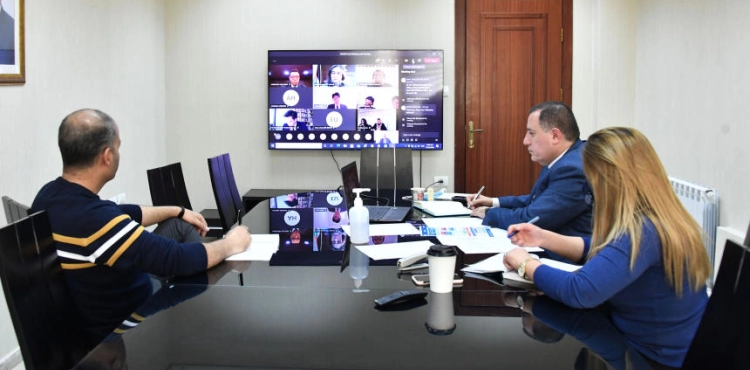The representatives of the governments of the "East Asia Conference for Cooperation in Supporting Development in Palestine" (CEPAD) held a meeting via the Internet, today, Tuesday, to review the group´s work and discuss future plans, especially budget scenarios, among the challenges Imposed by the global Corona pandemic, the aid required for this pandemic, the requirements for human development and the empowerment of the Palestinian state.
The meeting was chaired by the Advisor to the Prime Minister, Head of the Strategic Affairs Unit in the Prime Minister´s Office Ahmed Azm, and Head of the Middle East Department at the Japanese Ministry of Foreign Affairs, Kawahara Kazutaka, in the presence of representatives from Singapore, Malaysia, Thailand, Indonesia, Brunei, Vietnam, South Korea, and a number of the representative´s office staff. The Japanese delegation to the State of Palestine, the JICA office represented by Tosya Abe, the partner representatives in international institutions such as the Islamic Development Bank, the International Quartet Office, and the Relief and Works Agency for Refugees (UNRWA), in addition to the Palestinian core team members of the SEPAD program from the Ministry of Foreign Affairs, the Ministry of Finance, and Diwan General Staff, Office of the General Secretariat of the Council of Ministers.
The meeting discussed the support provided by CEPAD countries in the fields of agricultural development through the Department of Calves and Sheep Breeding and Fish Breeding, leading to support and export of the Palestinian product to some Southeast Asian countries, such as olive oil and dates, and support in the field of education, especially e-learning, and creating new job opportunities. Youth training in the field of digital economy in programming and coding. As well as introducing a change in the concept of tourism development that depends on the development of tourist villages and areas (tourist communities).
All the countries participating in the meeting expressed their support for the "two-state solution" and the need to resume the peace process according to international references, stressing the importance of empowering the Palestinian state, and continuing the work of the group established in 2010 to coordinate the efforts of East Asian countries to empower the Palestinian state.












